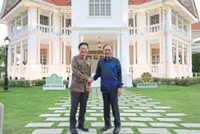SINGAPORE (The Straits Times/ANN): Although Singaporeans may have differing views on issues, especially global ones, “disagreement must never become division”, said Minister-in-charge of Muslim Affairs Masagos Zulkifli.
“If we are not careful, those cracks can deepen,” said Masagos, who is also the Social and Family Development Minister.
“In some countries, where trust was never built, minorities struggle to worship freely, even Muslims. Mosques are opposed; even cemeteries are contested.”
His comments to the media on the evening of April 26 came after the Government moved to block Facebook posts by three foreigners, for attempting to interfere in Singapore’s general election.
On April 25, the authorities said they had directed Meta to block access to posts by two Parti Islam Se-Malaysia (PAS) politicians and a former Singaporean who was an Internal Security Act (ISA) detainee.
Flanked by members of his team contesting Tampines GRC, Masagos said harmony in Singapore that was built over the decades did not come easy, and must never be taken for granted.
“It takes constant effort to protect our unity and keep at it,” he said, adding that Singaporeans’ shared identity must always come first.
Multiracialism and mutual respect, in particular, are why Singapore has peace, stability and progress, not just ideals, said Masagos.
“That is why we must never allow race or religion to be used as political tools.
“It’s even more dangerous when foreign elements interfere during our general election and use divisive language. It chips away at the trust we’ve worked so hard to build,” he said.
Masagos said that in Singapore, the trust between communities means Singaporeans, including Muslims, can live and worship with confidence, and mosques have been built in the heartland.
He declined to take questions from the media when giving comments in Tampines Avenue 4.
The opposition WP had earlier in the day disputed claims by a self-styled religious teacher that its candidates had agreed to take up the concerns raised by asatizah, or Islamic religious teachers, regarding the Malay/Muslim community in Singapore.
WP chief Pritam Singh said the religious teacher, Noor Deros, had turned up unannounced at the party’s meeting with Malay/Muslim religious leaders, and no promises were made with any individuals present in exchange for their political support.
The WP said it was firmly committed to “Singapore’s secular, multiracial, multi-religious society, and to protecting the integrity of our electoral process”.
Other politicians and political parties also weighed in on the issue on April 26.
Speaking to the media before a walkabout at Fuchun Market in the morning, Senior Minister of State Zaqy Mohamad said it was “very dangerous” that a party like PAS was asking Singaporeans to vote along religious and racial lines.
“That’s the kind of politics (that) perhaps you can see in Malaysia, where you have different parties representing different faiths or different races,” he said.
The incumbent MP for Marsiling-Yew Tee GRC added that a situation like this needed to be avoided, citing how racial riots were prevalent during the early days of the Republic’s independence.
Stressing that “Singaporean politics is for Singaporeans alone”, he said Singaporeans need to guard against the exploitation of race and religion. He encouraged people to make their own judgment and political choice, with the ideal of wanting a harmonious and peaceful country.
“The last thing you want is to go the way of some countries where there are political parties pushing the agenda of identity or race.”
At a separate event at a market in Teck Whye, Manpower Minister Tan See Leng described foreign interference in politics as a worrying trend.
The PAP anchor minister for Chua Chu Kang GRC reiterated that Singapore’s elections should be a purely domestic affair, and that foreign individuals “should take the cue that Singapore’s politics is entirely for Singaporeans”.
He said: “For us, it is our existence, it is our survival, it is our ability to come together, to be united, to reject all these foreign influences and interference, because we want to chart our own path ourselves, for a better and a more united Singapore.”
Minister in the Prime Minister’s Office Indranee Rajah, who is leading PAP’s slate in Pasir Ris-Changi GRC, said at the Pasir Ris Central Hawker Centre that Singapore needed to be “extremely careful” not to bring divisive politics into society.
On the other side of the political spectrum, Dr Tan Cheng Bock of the opposition PSP said Singaporeans do not need foreigners to “tell us what to do”.
The PSP founder, who was at Teban Gardens Food Centre, said: “We don’t need foreigners to interfere. They are on the outside (and) don’t know what’s happening here.”
Emphasising that this was the party’s stand, Dr Tan, who is contesting West Coast-Jurong West GRC, added that foreign actors act disingenuously by attempting to present seemingly nice ideas, which turn out to be dangerous.
SDP’s Damanhuri Abas said he supported the Government’s decision to block access to the posts.
The candidate for Sembawang GRC told the media during a walkabout at Marsiling Mall: “What the Government does is within the framework of law. We support it... We, too, wouldn’t want foreign interference in this country.”
SDP chief Chee Soon Juan, who spoke to reporters after a walkabout at Kampung Admiralty and Woodlands Mart, said the party is not interested in having foreigners endorse political candidates in Singapore.
“We don’t need the support... This is (a) domestic issue, and I just want to completely agree with the PAP. Stay out,” he said.
Dr Chee added: “We fight our own battle. We don’t go in and support other politicians when they have their elections in the country.
“Every country, every sovereignty, every citizenry, must have that exclusive right to elect their own leaders that they see fit.”
Another opposition party that chimed in was the National Solidarity Party (NSP), whose president Reno Fong told reporters after a walkabout in Tampines Street 32 that Singapore’s politics “is only for Singaporeans”.
Fong, who is leading his party’s team in Tampines GRC, said NSP takes a serious view of foreign intervention in local politics, and that there was no place for that here.
Beyond the political arena, the Republic’s oldest inter-faith body also weighed in the issue.
On April 25, the Inter-Religious Organisation (IRO) said peace in Singapore cannot be taken for granted.
Signed off by its president Gurmit Singh, its statement said: “In Singapore, we have witnessed the dangers of racial and religious conflicts in the past.
“This can come about when religion is mixed with politics, as witnessed in parts of the world.”
Comprising leaders and members from 10 religious groups, IRO added that religion has always been kept separate from politics here, because religious harmony is a crucial part of the country’s identity.
It said religion needed to be kept out of politics for the common good, and called on Singaporeans to continue to safeguard Singapore’s cohesion and unity.
Various religious groups and other organisations also issued statements expressing concern about foreign interference, and stressing the importance of keeping politics and religion separate.
These include the National Council of Churches Singapore, which reaffirmed its longstanding position that religion and politics must be kept separate. The Singapore Buddhist Federation did the same.
The ex-Singaporean flagged by the authorities, Zulfikar Mohamad Shariff, had accused several Malay-Muslim MPs here of failing to represent the interests of the Muslim community, and asserted that the local Muslim community did not need another Malay MP who did not reflect their concerns.
Now an Australian citizen, the former ISA detainee had also called on Muslims to reject the constitutional, secular and democratic state in favour of an Islamic state governed by Syariah law.
Meanwhile, PAS national treasurer Iskandar Abdul Samad had expressed support for WP’s vice-chair and Tampines GRC candidate Faisal Manap, as well as shared several other posts showing support for other opposition members from the Muslim community, including WP members and Damanhuri from SDP.
The other PAS politician - Mohamed Sukri Omar, the Islamist party’s Selangor Youth chief - had reposted Zulfikar’s post. - The Straits Times/ANN





